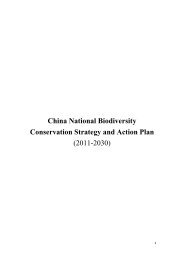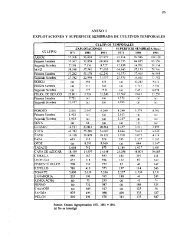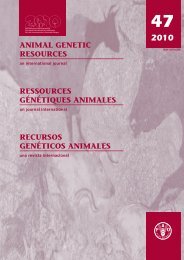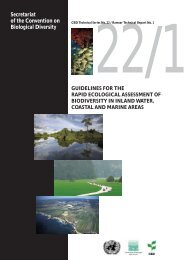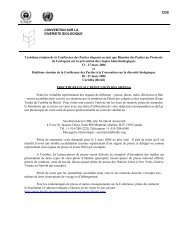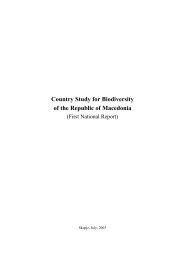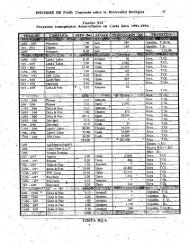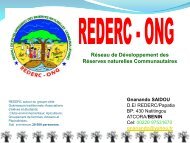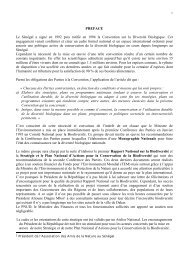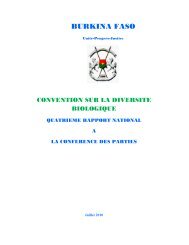CBD Fourth National Report - Azerbaijan (English version)
CBD Fourth National Report - Azerbaijan (English version)
CBD Fourth National Report - Azerbaijan (English version)
You also want an ePaper? Increase the reach of your titles
YUMPU automatically turns print PDFs into web optimized ePapers that Google loves.
Country Study on Biodiversity and <strong>Fourth</strong> <strong>National</strong> <strong>Report</strong><br />
The Republic of <strong>Azerbaijan</strong><br />
and, absence of adherence to operational and maintenance conditions in drilling, operation<br />
and refurbishment of wells and, indifferent attitude to nature conservancy actions.<br />
Particularly, land resources of Absheron suffered considerably and 7400 ha area became<br />
completely unusable together with boring and oil sludge, produced waters, various chemical<br />
reagents, heavy metals and other repugnant wastes. Natural lakes were polluted and there<br />
appeared multiple artificial lakes. Oil and petroleum derivatives settled down to 3 m or more<br />
and polluted subsurface waters hereof. Local areas contaminated with natural radioactive<br />
nuclides were discovered in sites of major mines. It should be noted that Absheron peninsula<br />
is one of the passage routes of migratory birds.<br />
A great extent of lands were contaminated with petroleum derivatives in areas of oil fields in<br />
Guba-Caspian zone and medium and lower Kura valley.<br />
30 thousand m 3 household-sanitary sewages diverted to the Caspian, 81 thousand tons of<br />
repugnant substances, including 58 thousand tons of hydrocarbons emitted in 2003. Presently,<br />
pollution of the environment is ongoing due to overdepreciation and obsolescence of oil<br />
mining and treatment facilities.<br />
Oil & gas extraction enterprises intermediately impact upon environmental components and<br />
other industry branches. Pollution of sea waters adversely impact to its fauna and flora and<br />
restricts shipping and fishery in any extent.<br />
Energy shortage occurs in electricity networks of Nakhichevan Autonomous Republic.<br />
Therefore, power energy is transmitted from neighbouring Iran and Turkey with intervals.<br />
Water power station over Araz river constructed jointly with Iran does not satisfy demand<br />
for energy. Great difficulties emerge in delivery of gas and pit coal fuels because of being<br />
under blockade condition of the region by Armenia Republic.<br />
No any oil are not extracted in Nakhichevan Autonomous Republic, but geological<br />
prospecting works conducted in many areas of the region proved existence of oil hereof.<br />
Presently, capital works are planned to be started in this sphere.<br />
3.2.8. Transport<br />
Rise in transportation volume through International Eurasia transport corridor functioning<br />
within the framework of TRASECA programme, increased number of transport enterprises<br />
and individuals engaged in automobile transport as well as growth in industry, agriculture,<br />
construction and other major production lines of the country in comparison with the previous<br />
years, seriously effect to development of transport.<br />
Number of transport enterprises which recorded at State Register of accounting units as legal<br />
entities, increased as 1.7% in comparison with the previous year totalled to 1220 and natural<br />
persons engaged in automobile transport without establishment of legal entity totalled to<br />
40000 by increasing as 28.4% up to January 1, 2009.<br />
Number of vehicles existing in the republic increased as 860.1 thousand in 2008 or as 348.6<br />
thousand in comparison with 2003. 81.4% of vehicles is shared by cars, 13.1% by trucks,<br />
3.4% by buses and remaining part by other automobiles. Number of private cars subject to per<br />
hundreds families equalled to 36 in the past year. Cargo transportation by legal entities and<br />
natural persons working for transport sector in 2001 increased as 183.1 million tons or 66.4%<br />
in comparison with 2003.<br />
97<br />
2009



